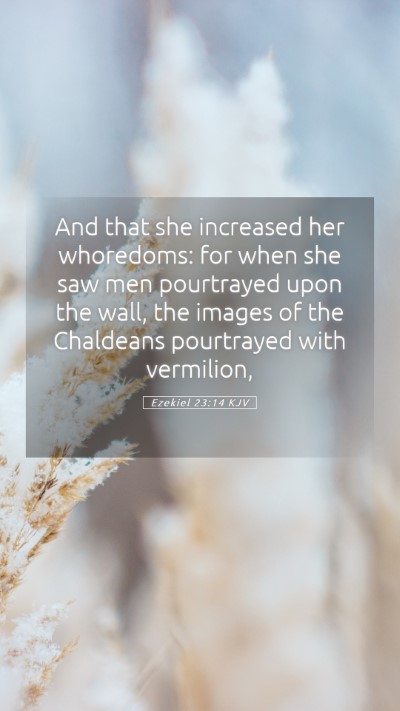Bible Verse Commentary: Ezekiel 23:14
Ezekiel 23:14 states, "And that she increased her whoredoms; for when she saw men portrayed upon the wall, the images of the Chaldeans portrayed with vermilion." This verse captures a symbolic representation of the two sisters, Ahola (representing Samaria) and Aholibah (representing Jerusalem), and their spiritual infidelity to God.
Meaning and Significance
This passage implies a deep betrayal of faith, showcasing the allure of idolatry and the seductions of foreign influences that the Israelites faced. The “whoredoms” referenced here indicate not only literal infidelity but also the unfaithfulness of the people to their covenant with God.
Insights from Public Domain Commentaries
-
Matthew Henry:
Henry explores the imagery of idolatry as akin to marital infidelity, emphasizing the seriousness of turning away from God. He notes that the portrayal of Chaldeans on walls symbolizes the attraction of foreign nations and their ungodly practices, leading Israel to temptation and sin.
-
Albert Barnes:
Barnes highlights the significance of the Chaldeans as a representation of worldly allure and corruption that captivates the Israelites. He suggests that the vivid imagery on the walls reflects how forsaking God results in a visible and shameful display of spiritual disloyalty.
-
Adam Clarke:
Clarke details the historical context, explaining that the Chaldeans were influential conquerors during the time and their depictions manifest the temptations faced by the people. He emphasizes the metaphor of 'whoredoms' as indicative of how the tempted people vainly sought satisfaction from foreign gods.
Contextual Analysis
To thoroughly understand this verse, one must consider the broader context within Ezekiel. The chapter outlines the unfaithfulness of Israel where God uses the allegory of two sisters to describe the nations. This analogy serves to demonstrate the depth of Israel’s downfall through their alliances with pagan nations.
Lessons for Today
The theme of spiritual fidelity is pertinent today. Just as Israel was drawn towards the allure of surrounding pagan cultures, modern believers must recognize the seductions of contemporary society that pull them away from their commitment to God.
Cross References
- Hosea 1:2: Highlights Israel's infidelity and serves as a parallel to Ezekiel's message.
- Isaiah 23:15-18: Discusses the downfall of Tyre and God’s judgment on nations representing both allure and destruction.
- Revelation 17:1-5: The imagery of a harlot in Revelation reflects the ultimate spiritual unfaithfulness, connecting back to Ezekiel's themes.
Application of Ezekiel 23:14
In applying this verse, believers are called to reflect on their own loyalties. It challenges individuals to evaluate what or whom they are choosing over God in their personal lives.
For Bible Study Groups
This verse provides a rich context for discussion in bible study groups. Facilitators can guide members through various interpretations and reflective applications that are relevant in current life situations.
Online Bible Study Resources
Use this verse as a study topic in online bible study forums, diving into its meanings and exploring its implications on faithfulness in today's context.
Conclusion
In summary, Ezekiel 23:14 serves as a powerful reminder of the dangers of spiritual infidelity and the temptations of idolatry. Through the insights of various commentators, this passage encourages deeper bible study insights and fosters a greater understanding of Scripture.
Whether through bible study guides, group discussions, or personal reflection, the essence of this verse and its implications for our lives today remains profoundly relevant.


